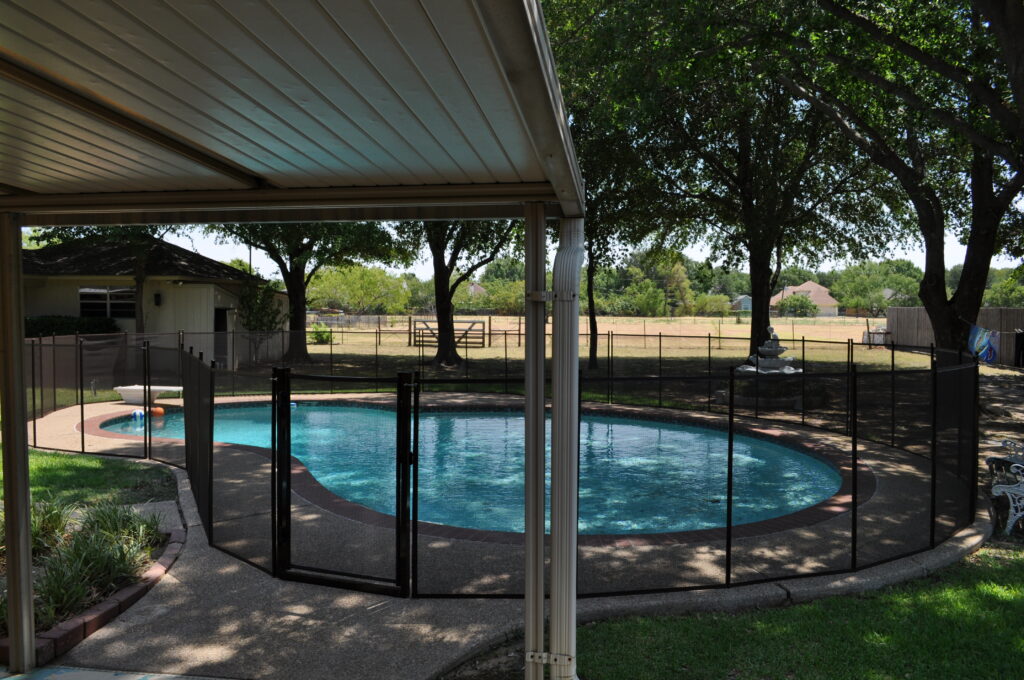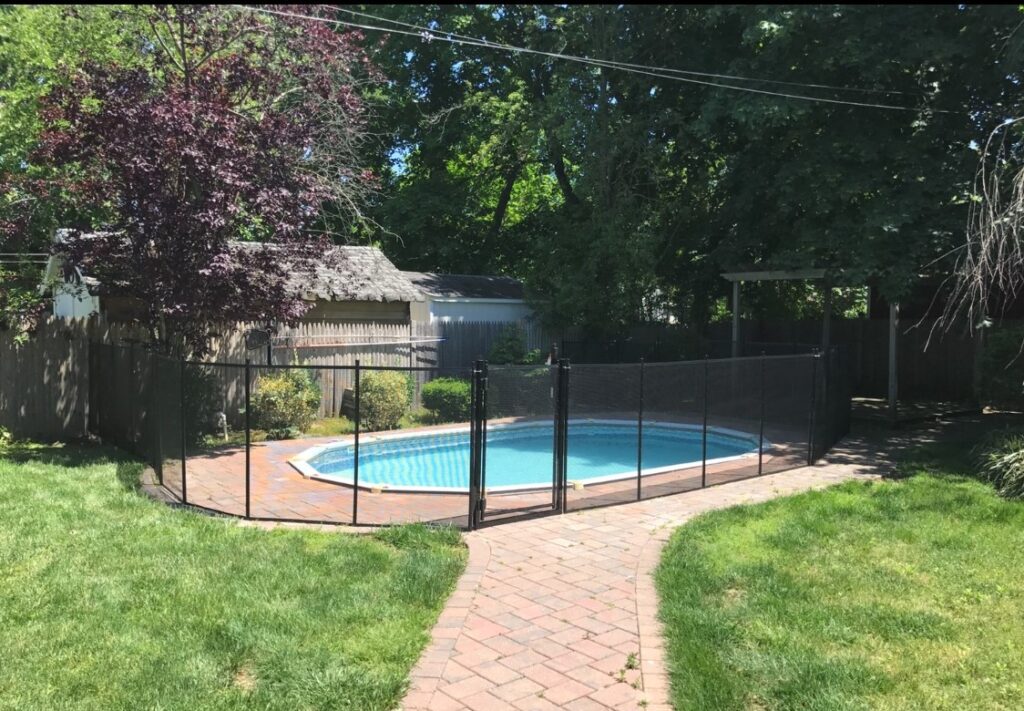Thinking about adding a pool to your backyard? Or maybe you’re already soaking up the summer vibes? Either way, if you own a pool in Pennsylvania, there’s one rule you can’t afford to overlook: the Pennsylvania pool fence code.
Whether it’s about protecting the kids, pets, or visitors, having a compliant pool barrier is one of the most responsible decisions a pool owner can make.
Stay as we break down everything you need to know about pool fence requirements in PA, including exact specs for in-ground pool rules, material choices, local ordinances, and inspection tips. Let’s dive into the facts that help you stay safe, legal, and worry-free.

In Pennsylvania, residential pool fencing is governed by the International Swimming Pool and Spa Code (ISPSC), adopted statewide under the Uniform Construction Code (UCC). This code sets the minimum safety standards for residential pools and spas, including fencing and entry barriers.
Under the PA pool fence laws, any pool with a depth of 24 inches or more, including inflatable or temporary pools, must be enclosed by a code-compliant barrier.
While the ISPSC sets the foundation, your local municipality may add stricter rules depending on zoning, safety concerns, or community design standards. This means you should always check both statewide regulations and local codes before you install.
Enforcement is handled locally through municipal building departments. Building inspectors will review your fence for compliance as part of your final pool permit inspection. If your fence fails the test, you could face costly rework or delays in using your pool.
Not all fences are created equal. To meet the Pennsylvania pool fence law, your fence must adhere to specific criteria that prioritize child safety and prevent unauthorized access.
Your pool fence must be at least 48 inches high, measured from the finished ground level to the top of the barrier. This standard applies to all sides of the pool enclosure.
The purpose is simple: a taller barrier reduces the risk of young children climbing over or falling in. If you’re installing a fence on uneven ground, be sure that all points meet the 48-inch minimum. If the walls are 48 inches high and inaccessible without a ladder, they may serve as the barrier, but only if the ladder is removable or lockable.
To comply with Pennsylvania pool fence code, no gaps or openings in your fence design should allow the passage of a sphere 4 inches in diameter or larger. This rule prevents children from squeezing through or getting stuck between pickets or panels.
For fences made of vertical pickets, this means each picket must be spaced narrowly enough to meet this 4-inch rule without exceptions. If you’re using chain-link fencing, the mesh size must not exceed 1.25 inches unless slats are inserted to reduce openings.
If you’re using a mesh pool fence, it must follow specific installation standards beyond general fence rules. The PA pool fence code required for mesh systems mesh must prevent a 4-inch sphere from passing under any section. The bottom clearance must never exceed 4 inches at any point.
There must be no more than 2 inches of vertical clearance between the bottom of the fence and the ground. This prevents crawling underneath the barrier, particularly for small children and pets.
If your property is sloped, you’ll need to use stepped fencing or install retaining boards to maintain this clearance along the entire length of the fence. Inspectors measure at every low point, so don’t assume that a high-grade on one end makes the whole line compliant.
The Pennsylvania pool fence law also prohibits climbable surfaces. That means your fence design must avoid horizontal rails or structural elements that can serve as footholds.
Specifically, if the fence is composed of horizontal and vertical components, the horizontal components used must be spaced at least 45 inches apart (measured vertically) to prevent climbing and placed from the inside of the swimming pool. For best results, choose a design with vertically oriented pickets and no horizontal members on the outside.
Some municipalities may even require inward-facing fence structures to prevent climbing from neighboring properties, especially in urban or high-density areas.
Any gate providing access to the pool area must comply with the requirements of Sections 30.3.1-205.3.3 of the Swimming Pool & Spa Barrier Requirements, and be equipped with a locking device. Other than that the gates need to be:
These gates must also swing outward, away from the pool area, not inward. This is a critical detail that many DIY installations get wrong, and it can lead to inspection failure.
If you use electronic or magnetic latches, they must still function automatically and reliably without needing constant attention.
If your home forms one wall of the pool enclosure, common in backyard pools, you’re required to install audible alarms on all doors that open into the pool area. These alarms must be:
This alarm requirement ensures that if a child exits through a sliding glass door or backdoor into the pool area, someone inside the home is immediately notified. In some areas, delayed rearming mechanisms or pool-safe door locks may also be mandated.

While the UCC and ISPSC form the legal base, local municipalities often enhance the rules for added safety or design harmony. Here are a few examples of stricter enforcement in PA.
In Whitehall Township, permits are required for all fences, not just those related to pools. This means that even decorative or perimeter fencing must go through a review process. If you’re installing a pool fence in Whitehall Township, you’ll need to adhere to their requirements based and adapted on the International Swimming Pool & Spa Code:
| Requirement | Specification |
| Minimum Fence Height | Fence must be at least 48 inches tall, measured from the finished ground surface. |
| Gate Standards | All access gates must be self-closing and self-latching, swinging outward. |
| Latch Placement | Gate latch controls must be positioned at least 54 inches from ground level. |
| Gap Limitations | Fence openings must not allow a 4-inch sphere to pass; clearance at base ≤ 2”. |
These requirements are designed to ensure the safety of residents, particularly children, by preventing unsupervised access to swimming pools. It’s essential to adhere to these standards when installing or modifying a pool fence in Whitehall Township.
Rapho Township aligns with the Uniform Construction Code (UCC) but adds a unique twist: it places strong emphasis on pre-approval of your fence plans. Before you break ground, the township recommends submitting a detailed fence plan, the location in relation to the pool and property lines and a list of the pool fence materials.
Why? Because non-standard fence designs like using dense hedges, lattice fencing, or mixing natural and man-made barriers may not pass inspection unless explicitly approved in writing.
Based on the official guidelines provided by Rapho Township, here is a summary of the pool fence requirements:
| Requirement | Specification |
| Minimum Fence Height | 48 inches (4 feet) |
| Gate Standards | Gates must be self-closing and self-latching. They should open outward, away from the pool area. |
| Latch Placement | The release mechanism for the gate latch must be located at least 54 inches above the ground. |
| Gap Limitations | Openings in the fence should not allow the passage of a sphere 4 inches in diameter. The space between the bottom of the fence and the ground should not exceed 2 inches. |
For more detailed information or specific inquiries, please refer to the official Rapho Township Swimming Pool Regulations document
In Franklin Township, there’s a clear message: temporary solutions are not enough. While the township does recognize ASTM-compliant pool fences, it states that these cannot be used as the sole protective barrier unless:
| Requirement | Standard |
| Minimum Fence Height | Barriers must be constructed to a minimum height of 48 inches to comply with township safety ordinances. |
| Gate Standards | Pool access gates must be equipped to close and latch automatically, and must swing away from the pool area. |
| Latch Placement | The gate latch release must be mounted no lower than 54 inches from the ground surface to restrict child access. |
| Gap Limitations | Fence openings must be narrow enough to prevent a 4-inch sphere from passing through. The bottom gap must be 2 inches or less from ground level. |
These fencing rules are designed to align with Pennsylvania’s pool safety code while adding an extra layer of protection for families in Franklin Township. Always confirm your design meets local inspection standards before beginning construction.
In Pennsylvania, a fence or safety barrier is legally required for any pool capable of holding 24 inches of water or more. Under the state’s Uniform Construction Code, this barrier must generally be at least 4 feet (48 inches) high and include self-closing, self-latching gates that open outward.
Yes. Under the Pennsylvania pool fence code, any pool with a depth of 24 inches or more, even temporary or inflatable ones, must have a compliant barrier. This includes above-ground, seasonal, and soft-sided pools. Just because it’s easy to set up doesn’t mean it’s exempt from the law. Safety and code enforcement apply regardless of the pool’s permanence.
Enforcement is handled at the local level, typically by your municipal building department or code enforcement office. They:
Always check with your local township or borough for any amendments or additions to the pool fence requirements pa.
Owning a pool in Pennsylvania comes with more than fun and relaxation—it comes with responsibility. Ensuring your pool fence meets the Pennsylvania pool fence code isn’t just about avoiding fines, it’s about protecting lives.
From accurate height measurements to correct gate hardware, every detail matters when it comes to safety and legal compliance.
At Pool Guard, we specialize in installing code-compliant, safety-certified pool fences across Pennsylvania. Our team guides you through permits and inspections, helps you choose materials that meet both legal standards and aesthetic preferences, and installs fencing that’s built to last and guaranteed to pass code.
Please fill out the form below with your information. Your local dealer will be notified about your inquiry.
Please fill out the form below with your information. Your local dealer will be notified about your inquiry.